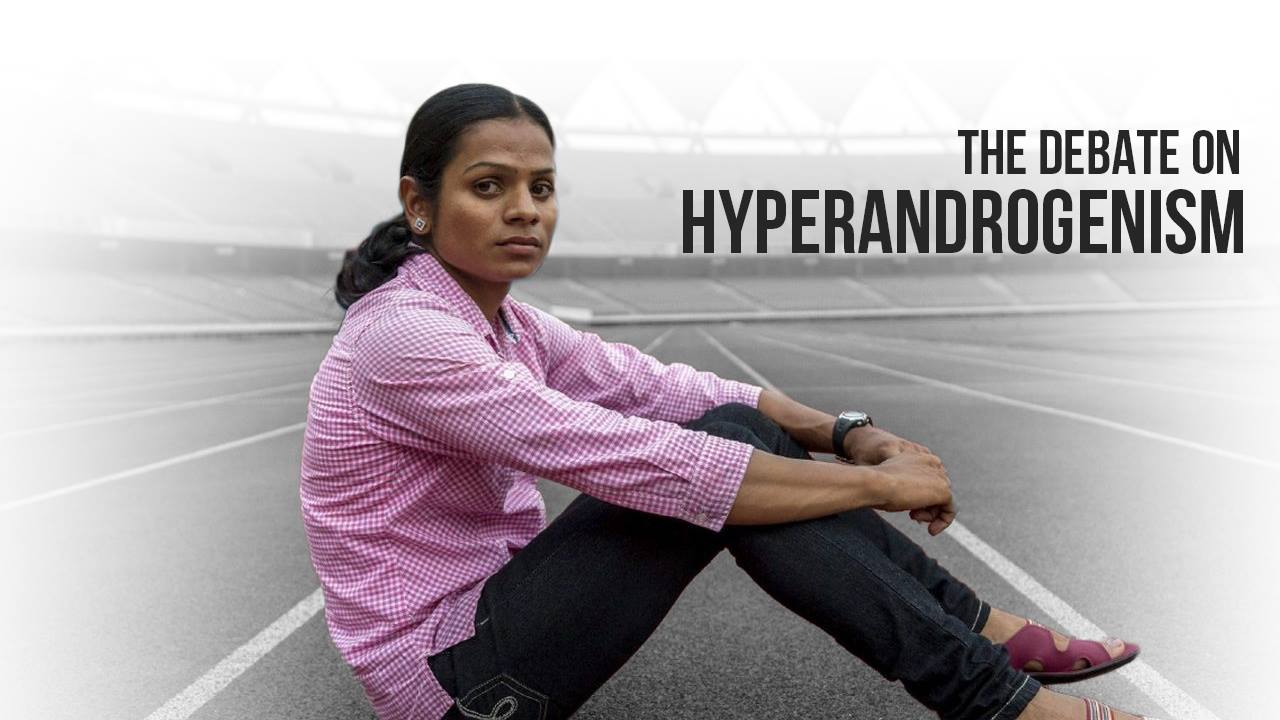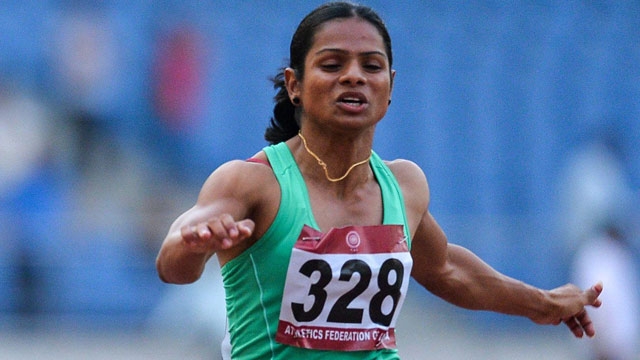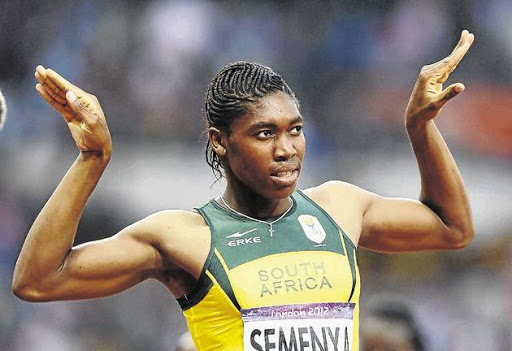Begin typing your search above and press return to search.
Law in Sports
The Hyperandrogen conundrum - Where does the verdict on IAAF stand at this moment?

The highly debatable issue of testosterone limit for female competitors in Athletics has been suspended for another six months, the Court of Arbitration for Sport (CAS) -- the highest court of sports -- has ruled. On 24 July 2015, following Indian sprinter Dutee Chand's challenge, in an 'Interim Award' released by the CAS, a decision was put out for suspending the International Association of Athletics Federations (IAAF) Hyperandrogenism Regulations. The IAAF was further asked to submit written evidence and expert reports addressing the concerns expressed by the CAS Panel in charge. The document that was asked to be submitted should be regarding those regulations, particularly relating to the degree of athletic performance enhancement gained by hyperandrogenic female athletes vis-a-vis non-hyperandrogenic female athletes by reason of their high levels of testosterone. The CAS mentioned that if the IAAF failed to submit the report within two years of the 'Interim Award', then the Hyperandrogenism regulations would be declared invalid. That research document, led by two French scientists, was published in the British Journal of Sports Medicine in July 2017 and formed the basis of the IAAF appeal, which had already been given an extension. On 29 September 2017, after being granted an extension from the CAS deadline, the IAAF filed materials including expert reports and legal submissions. With the new research suggesting that female athletes with high testosterone did have a 'significant competitive advantage' ' particularly in 400 metres, 400 metres hurdles, 800 metres, hammer throw and pole vault ' the IAAF proposed a revised rule that would only apply to track events between 400 metres and one mile. In response, on 6 October 2017, Chand's team challenged that proposal in October, saying the IAAF had not complied with CAS's original request, and pointed out that it did not apply to her, a sprinter, anyway.  Image: Orissa Diary On 3 November 2017, the CAS Panel determined that the IAAF's materials submitted on 29 September 2017 represented sufficient compliance with the Panel's directive and sought to support the Hyperandrogenism Regulations to the extent set out in the evidence it had filed. However, the Panel had made no ruling at this stage on the sufficiency of that evidence. The CAS has now issued that the dispute between athlete Dutee Chand and the IAAF remains suspended for six months, during which the IAAF Hyperandrogenism Regulations also remain suspended. What is Hyperandrogenism? Hyperandrogenism, also known as androgen excess, is a medical condition characterized by excessive levels of androgens (male sex hormones such as testosterone) in the female body and the associated effects of the elevated androgen levels. The Pretext IAAF introduced hyperandrogenism regulations in 2009 following the controversy surrounding South African athlete Caster Semenya's gender test at that year's World Championships. Semenya, who had won back-to-back Olympic golds for 800 metres, had to undergo the hyperandrogenism test when she was just 18, although her high testosterone levels were entirely natural.
Image: Orissa Diary On 3 November 2017, the CAS Panel determined that the IAAF's materials submitted on 29 September 2017 represented sufficient compliance with the Panel's directive and sought to support the Hyperandrogenism Regulations to the extent set out in the evidence it had filed. However, the Panel had made no ruling at this stage on the sufficiency of that evidence. The CAS has now issued that the dispute between athlete Dutee Chand and the IAAF remains suspended for six months, during which the IAAF Hyperandrogenism Regulations also remain suspended. What is Hyperandrogenism? Hyperandrogenism, also known as androgen excess, is a medical condition characterized by excessive levels of androgens (male sex hormones such as testosterone) in the female body and the associated effects of the elevated androgen levels. The Pretext IAAF introduced hyperandrogenism regulations in 2009 following the controversy surrounding South African athlete Caster Semenya's gender test at that year's World Championships. Semenya, who had won back-to-back Olympic golds for 800 metres, had to undergo the hyperandrogenism test when she was just 18, although her high testosterone levels were entirely natural.  Caster Semenya had won back-to-back Olympic golds for 800 metres in the World C'ships. (Image: Times Live) But as many competitors and experts claimed that Semenya and others with the same genetic condition, had an unfair advantage, the IAAF decided to set a testosterone limit for female athletes to participate. The permissible testosterone limit was set at 10 nmol/L, based on a study of women competing in the World Championships in 2011 and 2013.[37] 99% of the female athletes at those competitions had testosterone levels below 3.08 nmol/L.[37] This upper limit of 10 nmol/L was more than 3 times higher than the testosterone levels of 99% of the elite female athletes in those competitions. As an implication to this regulations, Semenya and several others were forced to undergo treatment to reduce their levels of the hormone. In September 2014, Dutee Chand was barred by the IAAF from competing against other female runners. But she sought to appeal the ruling and asked for reinstatement. Dutee's case had galvanised critics of the IAAF rule to challenge it. Fresh implications The new hearing by the CAS could have fresh implications for Semenya. Within this six months, the IAAF has to provide the CAS the necessary blueprint of how it intends to implement its Hyperandrogenism regulations. CAS has told the IAAF it can either stick to its 2015 rule and continue the legal battle after six months, or it can drop the rule completely or bring in the revised rule suggested last year and Chand's case will be closed. "If the IAAF withdraws the Hyperandrogenism Regulations or replaces them with the proposed draft regulations it has submitted, then these proceedings will be terminated", adjudged CAS. The present decision over Hyperandrogenic regulations remains lackadaisical and the debatable row is yet to be over.
Caster Semenya had won back-to-back Olympic golds for 800 metres in the World C'ships. (Image: Times Live) But as many competitors and experts claimed that Semenya and others with the same genetic condition, had an unfair advantage, the IAAF decided to set a testosterone limit for female athletes to participate. The permissible testosterone limit was set at 10 nmol/L, based on a study of women competing in the World Championships in 2011 and 2013.[37] 99% of the female athletes at those competitions had testosterone levels below 3.08 nmol/L.[37] This upper limit of 10 nmol/L was more than 3 times higher than the testosterone levels of 99% of the elite female athletes in those competitions. As an implication to this regulations, Semenya and several others were forced to undergo treatment to reduce their levels of the hormone. In September 2014, Dutee Chand was barred by the IAAF from competing against other female runners. But she sought to appeal the ruling and asked for reinstatement. Dutee's case had galvanised critics of the IAAF rule to challenge it. Fresh implications The new hearing by the CAS could have fresh implications for Semenya. Within this six months, the IAAF has to provide the CAS the necessary blueprint of how it intends to implement its Hyperandrogenism regulations. CAS has told the IAAF it can either stick to its 2015 rule and continue the legal battle after six months, or it can drop the rule completely or bring in the revised rule suggested last year and Chand's case will be closed. "If the IAAF withdraws the Hyperandrogenism Regulations or replaces them with the proposed draft regulations it has submitted, then these proceedings will be terminated", adjudged CAS. The present decision over Hyperandrogenic regulations remains lackadaisical and the debatable row is yet to be over.
 Image: Orissa Diary On 3 November 2017, the CAS Panel determined that the IAAF's materials submitted on 29 September 2017 represented sufficient compliance with the Panel's directive and sought to support the Hyperandrogenism Regulations to the extent set out in the evidence it had filed. However, the Panel had made no ruling at this stage on the sufficiency of that evidence. The CAS has now issued that the dispute between athlete Dutee Chand and the IAAF remains suspended for six months, during which the IAAF Hyperandrogenism Regulations also remain suspended. What is Hyperandrogenism? Hyperandrogenism, also known as androgen excess, is a medical condition characterized by excessive levels of androgens (male sex hormones such as testosterone) in the female body and the associated effects of the elevated androgen levels. The Pretext IAAF introduced hyperandrogenism regulations in 2009 following the controversy surrounding South African athlete Caster Semenya's gender test at that year's World Championships. Semenya, who had won back-to-back Olympic golds for 800 metres, had to undergo the hyperandrogenism test when she was just 18, although her high testosterone levels were entirely natural.
Image: Orissa Diary On 3 November 2017, the CAS Panel determined that the IAAF's materials submitted on 29 September 2017 represented sufficient compliance with the Panel's directive and sought to support the Hyperandrogenism Regulations to the extent set out in the evidence it had filed. However, the Panel had made no ruling at this stage on the sufficiency of that evidence. The CAS has now issued that the dispute between athlete Dutee Chand and the IAAF remains suspended for six months, during which the IAAF Hyperandrogenism Regulations also remain suspended. What is Hyperandrogenism? Hyperandrogenism, also known as androgen excess, is a medical condition characterized by excessive levels of androgens (male sex hormones such as testosterone) in the female body and the associated effects of the elevated androgen levels. The Pretext IAAF introduced hyperandrogenism regulations in 2009 following the controversy surrounding South African athlete Caster Semenya's gender test at that year's World Championships. Semenya, who had won back-to-back Olympic golds for 800 metres, had to undergo the hyperandrogenism test when she was just 18, although her high testosterone levels were entirely natural.  Caster Semenya had won back-to-back Olympic golds for 800 metres in the World C'ships. (Image: Times Live) But as many competitors and experts claimed that Semenya and others with the same genetic condition, had an unfair advantage, the IAAF decided to set a testosterone limit for female athletes to participate. The permissible testosterone limit was set at 10 nmol/L, based on a study of women competing in the World Championships in 2011 and 2013.[37] 99% of the female athletes at those competitions had testosterone levels below 3.08 nmol/L.[37] This upper limit of 10 nmol/L was more than 3 times higher than the testosterone levels of 99% of the elite female athletes in those competitions. As an implication to this regulations, Semenya and several others were forced to undergo treatment to reduce their levels of the hormone. In September 2014, Dutee Chand was barred by the IAAF from competing against other female runners. But she sought to appeal the ruling and asked for reinstatement. Dutee's case had galvanised critics of the IAAF rule to challenge it. Fresh implications The new hearing by the CAS could have fresh implications for Semenya. Within this six months, the IAAF has to provide the CAS the necessary blueprint of how it intends to implement its Hyperandrogenism regulations. CAS has told the IAAF it can either stick to its 2015 rule and continue the legal battle after six months, or it can drop the rule completely or bring in the revised rule suggested last year and Chand's case will be closed. "If the IAAF withdraws the Hyperandrogenism Regulations or replaces them with the proposed draft regulations it has submitted, then these proceedings will be terminated", adjudged CAS. The present decision over Hyperandrogenic regulations remains lackadaisical and the debatable row is yet to be over.
Caster Semenya had won back-to-back Olympic golds for 800 metres in the World C'ships. (Image: Times Live) But as many competitors and experts claimed that Semenya and others with the same genetic condition, had an unfair advantage, the IAAF decided to set a testosterone limit for female athletes to participate. The permissible testosterone limit was set at 10 nmol/L, based on a study of women competing in the World Championships in 2011 and 2013.[37] 99% of the female athletes at those competitions had testosterone levels below 3.08 nmol/L.[37] This upper limit of 10 nmol/L was more than 3 times higher than the testosterone levels of 99% of the elite female athletes in those competitions. As an implication to this regulations, Semenya and several others were forced to undergo treatment to reduce their levels of the hormone. In September 2014, Dutee Chand was barred by the IAAF from competing against other female runners. But she sought to appeal the ruling and asked for reinstatement. Dutee's case had galvanised critics of the IAAF rule to challenge it. Fresh implications The new hearing by the CAS could have fresh implications for Semenya. Within this six months, the IAAF has to provide the CAS the necessary blueprint of how it intends to implement its Hyperandrogenism regulations. CAS has told the IAAF it can either stick to its 2015 rule and continue the legal battle after six months, or it can drop the rule completely or bring in the revised rule suggested last year and Chand's case will be closed. "If the IAAF withdraws the Hyperandrogenism Regulations or replaces them with the proposed draft regulations it has submitted, then these proceedings will be terminated", adjudged CAS. The present decision over Hyperandrogenic regulations remains lackadaisical and the debatable row is yet to be over.Next Story






